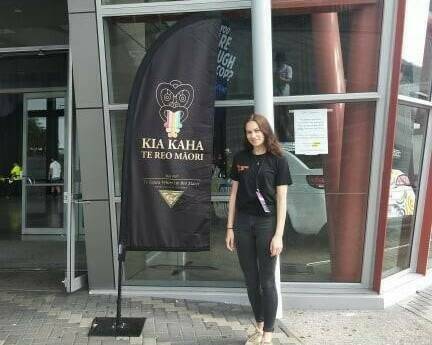Raranga Tahi Summit – invigorating te reo Māori through rangatahi
UNESCO Aotearoa Youth Leader, Māia Tapsell, spent a couple of days in Auckland in December 2019 at a summit encouraging young people to help foster more spoken reo throughout Aotearoa.
Here she reflects
The Raranga. Tahi Summit was held by Te Taura Whiri i te Reo Māori in Tāmaki Makaurau on the 4th and 5th of December. The Summit was founded on a series of regional workshops that took place throughout 2019, which aimed to capture the energy and optimism of rangatahi to invigorate the Crown’s Māori Language strategy, which aims at having a million New Zealanders able to speak Māori by 2040.
The summit programme was impressive, and the event was packed with well-known Māori leaders. Hosts Sonny Ngatai and Pere Wihongi were fun and captivating, keeping everyone’s attention throughout the event.
On the first day masterclasses were hosted by well-known leaders such as Hana Tapiata, Te Korou Whangataua and Juneea Silbery. These masterclasses covered themes such as wellbeing, leadership, identity, development, voice and rumaki reo. As a Youth Leader it was interesting sitting in on these workshops and watching how rangatahi participated. In the identity workshop, we were asked to write down what scares us about te ao Māori on a sticky note, and then share these concerns in a small group before placing them on a wall alongside everyone else’s. It was amazing to see a common theme emerge: Māori and non-Māori alike expressed feeling too whakamā (shy) to speak Māori in front of others – those they perceived were better speakers than them. Feeling whakamā has resonated with me for a while, but to see just how many people were affected by this feeling was really grounding.
I was lucky enough to attend two other workshops held by Te Korou Whangataua and Juneea Silbery (Rumaki reo, and translators for the Waiata/Anthems album released during Te Wiki o te Reo Māori) and Hana Tapiata (Wellbeing). In these workshops we learnt new kīwaha (slang) and discussed wellbeing and whakapapa (geneology). These sessions were particularly heartwarming, rangatahi expressed their pride for their reo and ao Māori. This felt to me to be a significant generational change in thinking: whenever rangatahi were asked if they were embarrassed to be Māori they replied, ‘no, it’s cool to be Māori.’
The rest of the summit ran smoothly, with guest performances by Te Wehi Haka, Maimoa and David and Ashley – all incredibly talented groups that blew us away. Surrounded by so many successful Māori, the summit was inspiring and motivating to further my reo. My favourite moments included sharing a table with the famed Hepi Mita during dinner (who delivered a wonderful speech on how limitless our opportunities are as rangatahi), and listening to rangatahi from my current home, Ōtākou, sing an incredible waiata in English and Māori.
Without a doubt, the Raranga. Tahi summit indeed captured the energy and optimism of Aotearoa’s rangatahi. I left feeling invigorated and hopeful for our future as a bilingual country.
Kia kaha te reo Māori!

